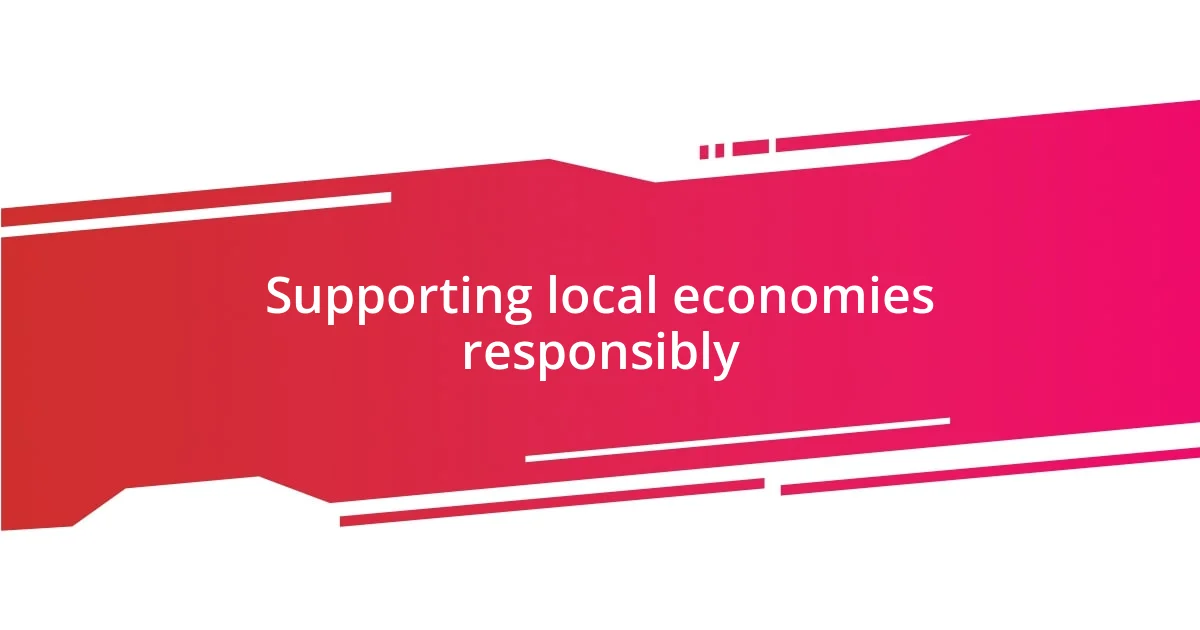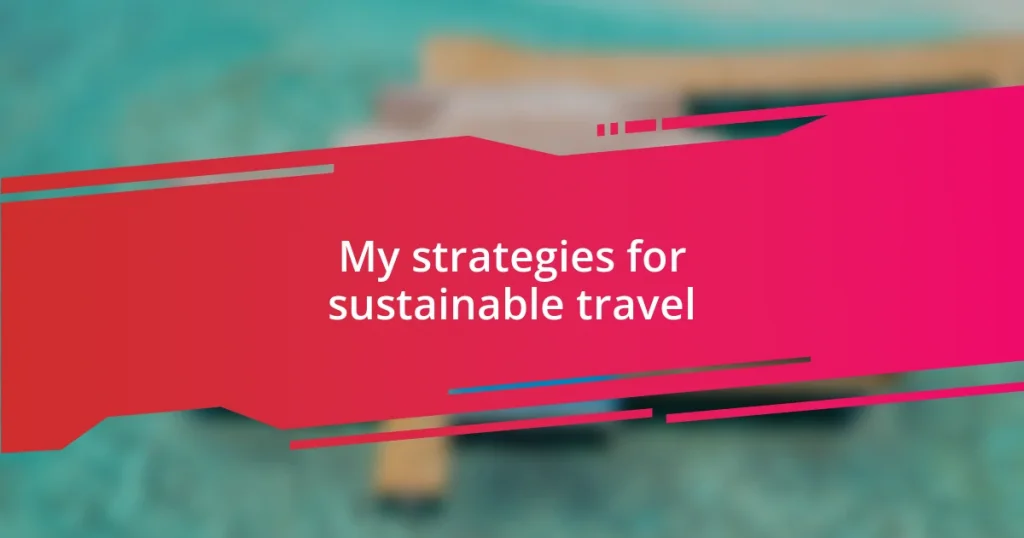Key takeaways:
- Sustainable travel principles emphasize minimizing waste, supporting local economies, and making eco-conscious choices to preserve environments and cultures.
- Benefits of sustainable travel include a deeper connection with nature, enriched cultural experiences, and promotion of healthier lifestyles through active exploration.
- Engaging with local communities through activities like local dining, guided tours, and volunteer work enhances travel experiences and fosters meaningful connections while supporting local economies.

Understanding sustainable travel principles
Understanding sustainable travel principles begins with recognizing our responsibility to protect the environment while enjoying our adventures. I often think about how a seemingly small decision, like choosing public transport over a taxi, can significantly reduce my carbon footprint. Have you ever considered how your travel choices impact the places you visit?
One principle I embrace is minimizing waste, particularly when it comes to single-use plastics. During a trip to a beautiful island, I remember being shocked by the amount of plastic debris littering the shore. It made me realize that every bottle I choose to bring or buy can contribute to that problem or help solve it. What would it feel like to leave a destination better than I found it?
Another key aspect is supporting local economies. I recall dining at a mom-and-pop restaurant during a recent trip, where the food not only surpassed any chain meal but also provided income directly to the family running it. Isn’t it heartwarming to know that our choices can empower local communities and preserve their cultures? Through these principles, I’ve come to appreciate the essence of travel—it’s not just about the sights, but the connections we forge along the way.

Benefits of sustainable travel
Sustainable travel offers several benefits that resonate deeply with my own experiences. For one, it fosters a profound connection with nature. I recall hiking through a protected forest where I was not just an observer, but a participant in the ecosystem. The fresh air, vibrant colors, and the sound of rustling leaves left me feeling rejuvenated. Realizing that my travel choices could help preserve such beauty makes every adventure feel more meaningful.
Another significant advantage is the opportunity to learn from local cultures. During a trip to a remote village, I participated in a traditional cooking class that was a highlight of my journey. The joy of cooking alongside local chefs while hearing their stories about heritage and tradition was truly enriching. Isn’t it amazing how supporting sustainable tourism allows us to gain insights that go beyond just sightseeing?
Additionally, sustainable travel can also lead to healthier lifestyles. I often prioritize activities that keep me active, like biking or hiking, rather than relying on vehicles. This not only aligns with my values but also enhances my physical wellbeing. Have you ever noticed how exploring a destination on foot opens up so many more experiences? It feels like every step brings a new story waiting to be discovered.
| Benefit | Explanation |
|---|---|
| Connection with Nature | Promotes appreciation for the environment. |
| Cultural Engagement | Offers immersive experiences with local traditions. |
| Healthier Lifestyle | Encourages physical activity and well-being. |

Choosing eco-friendly destinations
When it comes to choosing eco-friendly destinations, I find myself drawn to places that prioritize sustainability in their practices and culture. For instance, I once visited a small coastal town that had implemented strict waste management policies, and it was awe-inspiring to witness how the community engaged everyone in keeping the area pristine. Seeing locals gather for beach clean-ups made me feel a part of something larger than just a vacation—it felt like a shared commitment to our planet. I remember thinking how vital it is to select locations that reflect our values, encouraging a deeper connection to the places we explore.
Here are some factors I consider when selecting eco-friendly destinations:
- Sustainable practices: Look for places that engage in recycling, clean energy use, or organic farming.
- Community involvement: I love destinations where locals actively participate in conservation efforts, as it creates a richer travel experience.
- Wildlife preservation: Choosing places that support the protection of natural habitats resonates with my desire to see animals in their true environments.
- Cultural respect: Understanding how a destination honors its traditions and values shows a commitment to sustainable tourism.
- Transportation options: Areas promoting public transport or cycling encourage a smaller carbon footprint, which I always appreciate.
Every decision I make contributes to a larger narrative—one where travel can be a force for good. I believe that by being more thoughtful about our choices, we can discover a world that not only captivates but also respects and nurtures our planet.

Tips for reducing carbon footprint
One of the easiest ways I’ve found to reduce my carbon footprint while traveling is to travel light. I remember a time when I packed way too much for a weekend getaway, and lugging around that heavy suitcase felt like a marathon. Now, I focus on essentials only, opting for versatile clothing that can be mixed and matched. Not only does this lighten my load, but it also minimizes the weight on planes, which, believe it or not, helps reduce fuel consumption. Have you ever considered how a lighter suitcase could contribute to a greener journey?
Another impactful choice I’ve made is to embrace public transportation or biking instead of hopping in a rental car. During a visit to Amsterdam, I swapped out car rides for a bike rental, and it transformed my experience. I was able to weave through charming streets and discover hidden gems that I might have missed while driving. Plus, there’s something freeing about feeling the wind on your face as you pedal through a new city! Why not give it a shot? You might find that local transport is not just eco-friendly but also incredibly enjoyable.
Lastly, one revelation that’s stuck with me is the importance of dining consciously. When I travel, I always seek out local, farm-to-table restaurants that source ingredients sustainably. I vividly recall tasting fresh vegetables and herbs bursting with flavor from a local market in Tuscany, and it struck me how much more connected I felt to the place. Eating locally not only significantly reduces carbon emissions associated with food transport but also allows me to support the community. Have you ever noticed how food prepared from locally-sourced ingredients tastes even better? It’s all about those rich connections we create through our choices.

Sustainable accommodation options
A fantastic way to ensure sustainable accommodation during my travels is to seek out eco-friendly hotels or lodges that prioritize environmental practices. During a visit to Costa Rica, I stayed in a charming eco-lodge that was built using local materials and operated on renewable energy. The experience was not just about comfort; it felt rewarding to know that my stay was supporting a business that respected the land and engaged in balanced tourism. Have you ever felt that warm sense of connection to a place just because of its ethical choices?
I’ve also found joy in exploring alternative lodging options, such as guesthouses or home exchanges. In Greece, I opted for a quaint rental within a family-run establishment. The hosts shared stories about their sustainable farming practices and even invited us to help in the garden. It was heartwarming and educational! Imagine how much richer a travel experience can be when you connect deeply with locals who share their insights and traditions with you. Isn’t it wonderful to create memories that go beyond the typical tourist experience?
Furthermore, I’m a strong advocate for supporting accommodations that promote wildlife conservation. On a recent trip to Kenya, I stayed at a safari camp that backed local conservation initiatives. Not only did I enjoy breathtaking views of the savannah, but I also learned about the critical efforts to protect endangered species. It was inspiring to be a part of something bigger than myself and realize that each time we choose our accommodation thoughtfully, we help sustain the places we visit. How amazing is it that our travel choices can contribute to protecting our planet’s biodiversity?

Supporting local economies responsibly
Supporting local economies during my travels has always been a priority for me. I remember wandering through markets in a small village in Thailand, where the smiles of local artisans reflected their passion for their crafts. Investing in handmade goods not only allowed me to take home a unique souvenir but also directly contributed to their livelihoods. Have you ever stopped to think about who made the items you bring home? It really makes the connection more meaningful.
Then, there’s the thrill of dining at family-owned restaurants. On a recent trip to Mexico, I stumbled upon a tiny taqueria run by a warm, spirited grandmother who shared stories of her grandmother’s secret recipes. The food was exquisite, but what truly resonated was knowing that my meal was helping her family sustain their business. Isn’t it incredible how food can create ties between travelers and local communities? Eating local is more than just a meal; it’s an experience grounded in culture and tradition.
Lastly, I’ve learned that participating in local tours led by community members can be an enriching experience. During a visit to a rural village in Peru, I joined a guided hike with a local who shared fascinating insights about their customs and the environment. I felt like I was witnessing the heartbeat of the place itself. Isn’t the opportunity to learn directly from the people what truly brings a destination to life? Each encounter not only enriched my understanding but also supported local guides, ensuring they benefited economically while preserving their culture.

Engaging in community-focused activities
Engaging in community-focused activities during my travels has provided some of my most memorable experiences. For instance, while visiting a small town in Brazil, I joined a local dance workshop hosted by residents eager to share their vibrant culture. It was exhilarating to step outside my comfort zone and learn traditional samba moves alongside locals, laughing and connecting in ways that transcended language. Have you ever felt that pulse of a community when you immerse yourself in their traditions?
I also cherish volunteering opportunities I’ve taken part in, which have deepened my appreciation for the places I visit. On my journey through rural India, I spent a week helping at a local school, teaching English to eager young students. Their infectious enthusiasm not only made the experience fulfilling but also opened my eyes to their daily challenges. Isn’t it fascinating how giving back can enrich your travel experience while creating impactful memories?
Moreover, I enjoy visiting community markets, where the atmosphere buzzes with life and connection. During a recent trip to Morocco, I was invited to join a community cooking class, led by a local chef who shared her family recipes and cooking secrets. It felt like stepping into her home, surrounded by laughter and the fragrant aroma of spices. Isn’t that what travel is all about—creating bonds and understanding the heart of a place? It’s these community interactions that make a trip feel real and significant.















